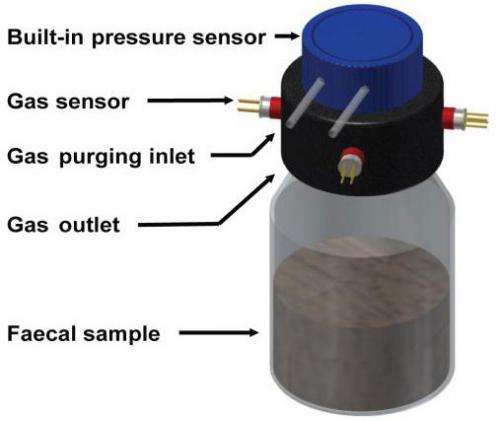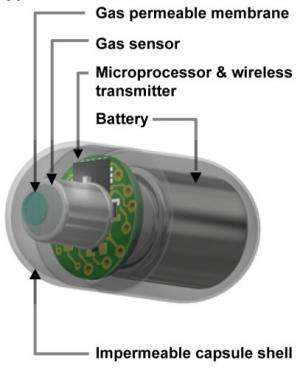Intestinal gas could be used to diagnose diseases

Microbes in the human body are estimated to outnumber human cells by 10 to 1, yet research on how they affect health is still in its infancy. A perspective article published by Cell Press on March 12th in Trends in Biotechnology presents evidence that gut microbes produce gases that may contribute to gastrointestinal diseases and could be used as biomarkers for one's state of health. As means to measure these potential biomarkers, the authors suggest two novel gas-sensing systems, one of which is an electronic gas sensor in the form of a pill you can swallow. These systems may offer a reliable and economical way to understand the impact of intestinal gases on human health, paving the way for the development of new diagnostic techniques and therapies.
"The human gut's effect on gastrointestinal diseases consumes a significant portion of health care expenditure every year worldwide," says senior author Kourosh Kalantar-zadeh, a professor of electrical and computer engineering at RMIT University in Melbourne, Australia. "Innovative point-of-care methodologies for assessing gut state and diagnosing relevant diseases, as described in this article, will bring unprecedented benefits to the general public by providing medical and diagnostic devices that significantly reduce medical costs and improve the efficiency of the health care system."
Different types of microbes found in the gut produce unique gases as a byproduct of their metabolism. For example, sulfate-reducing bacteria produce hydrogen sulfide, a pungent odor reminiscent of rotten eggs, while methanogenic archaea produce the odorless gas methane. Because these intestinal gases have been linked to diseases such as irritable bowel syndrome, inflammatory bowel disease, and colon cancer, accurately measuring intestinal gases could accelerate knowledge about the potential contribution of specific gut microbes to various gastrointestinal health states. However, current methods such as breath analysis do not accurately reflect the composition of gases found in the gut, highlighting the need for more reliable approaches.
According to the authors, in vitro fermentation systems and swallowable gas capsules represent promising alternatives. Fermentation methods involve obtaining fecal samples from humans and culturing them in an oxygen-free, humid environment resembling the gastrointestinal tract. Gas samples are then collected from the fecal cultures and quantitatively analyzed to separate out different types of gases.
A more direct and accurate approach involves the use of encapsulated gas sensors that can be swallowed and sample gases while inside the intestine. These electronic gas sensor "pills" consist of a protective shell, a gas-permeable membrane window, a gas sensor, a microprocessor and wireless transmitter to process and transfer the data, and a miniature battery.

The authors discuss options for overcoming various challenges to implementation and also recommend that future research focus on assessing the long-term performance of these systems. In the end, these advances could lead to more reliable and economical diagnostic devices.
"Because both techniques are noninvasive, they have the potential to significantly impact relevant medical industries and public health sectors, facilitating the formulation of point-of-care methodologies for diagnostics and potentially new diet- or drug-based therapies for gastrointestinal diseases," Kalantar-zadeh says.
More information: Trends in Biotechnology, Ou et al.: "Human intestinal gas measurement systems: in vitro fermentation and gas capsules" (2015)




















